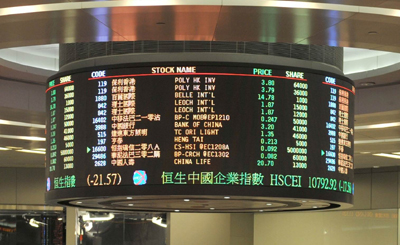Wednesday, 15 July 2015 15:16
 HONG KONG: Hong Kong shares ended 0.26% percent lower Wednesday, tracking losses in Shanghai, after China released data showing the mainland economy grew more than expected in the second quarter of the year.
HONG KONG: Hong Kong shares ended 0.26% percent lower Wednesday, tracking losses in Shanghai, after China released data showing the mainland economy grew more than expected in the second quarter of the year.
The benchmark Hang Seng Index (HSI)lost 65.15 points to 25055.76 on turnover of HK$ 104.63 billion (US$ 13.49 billion).
Shanghai tumbled 3.03 percent.
China’s National Bureau of Statistics revealed that the world’s number two economy grew 7.0 percent year on year in April-June, the same as the previous three months and better than the median forecast of 6.9 percent in an AFP survey of 14 economists.
The data follows a slew of disappointing results that have led to a series of measures — including four interest rate cuts since November — to shore up stumbling growth.
However, Bernard Aw, a Singapore-based strategist at IG Asia, said: “The GDP numbers are really good. The better-than-expected GDP reading suggested that Beijing may take its foot off the pedal on more stimulus measures for the time being. This will affect sentiment in the stock market.”
The losses in both markets are the second after they enjoyed a three-day rebound that came in the wake of Beijing’s moves to prevent a crash in Shanghai following a near-month long sell-off by mainland investors.
Among Hong Kong firms, Tencent fell 1.85 percent to HK$ 148.90, while casino operator Sands China also lost 1.85 percent to HK$ 31.85. Insurance giant AIA climbed 1.10% to HK$ 50.45 and HSBC added 0.80 percent to HK$ 69.10.
On Wednesday Shanghai’s benchmark composite index dropped 118.79 points to 3,805.70 on turnover of 700.5 billion yuan ($ 114.6 billion). The index fell as much as 4.67 percent in afternoon trading before trimming losses.
The Shenzhen Composite Index, which tracks stocks on China’s second exchange, slumped 4.22 percent, or 90.68 points, to 2,058.84 on turnover of 545.5 billion yuan.
The Shanghai index surged more than 150 percent in a year to hit a June 12 peak before plunging more than 30 percent as investors became spooked by factors including high valuations and stricter rules on margin trading.
To stop the rot Beijing announced several measures including a police crackdown on short-selling and a ban on big shareholders and company executives from selling stock for six months, adding to earlier measures.
“There’s profit-taking after the market’s recent rebound,” said Jeffrey Chiu, a Hong Kong-based trader at Winnington Capital.
“The market will slowly come down again and we will see more consolidation. There are people who believe in the government’s measures and those who don’t.”
Steel manufacturers were among the biggest losers in Shanghai. Xinyu Iron & Steel slumped by its 10 percent daily limit to 5.46 yuan while Fangda Special Steel Technology also lost 10 percent to 7.16 yuan.
Pharmaceutical firms fell. In Shenzhen, Hubei Guangji Pharmaceutical dropped by its 10 percent daily limit to 11.75 yuan and Zhejiang Xianju Pharmaceutical also fell 10 percent to 13.46 yuan.



























